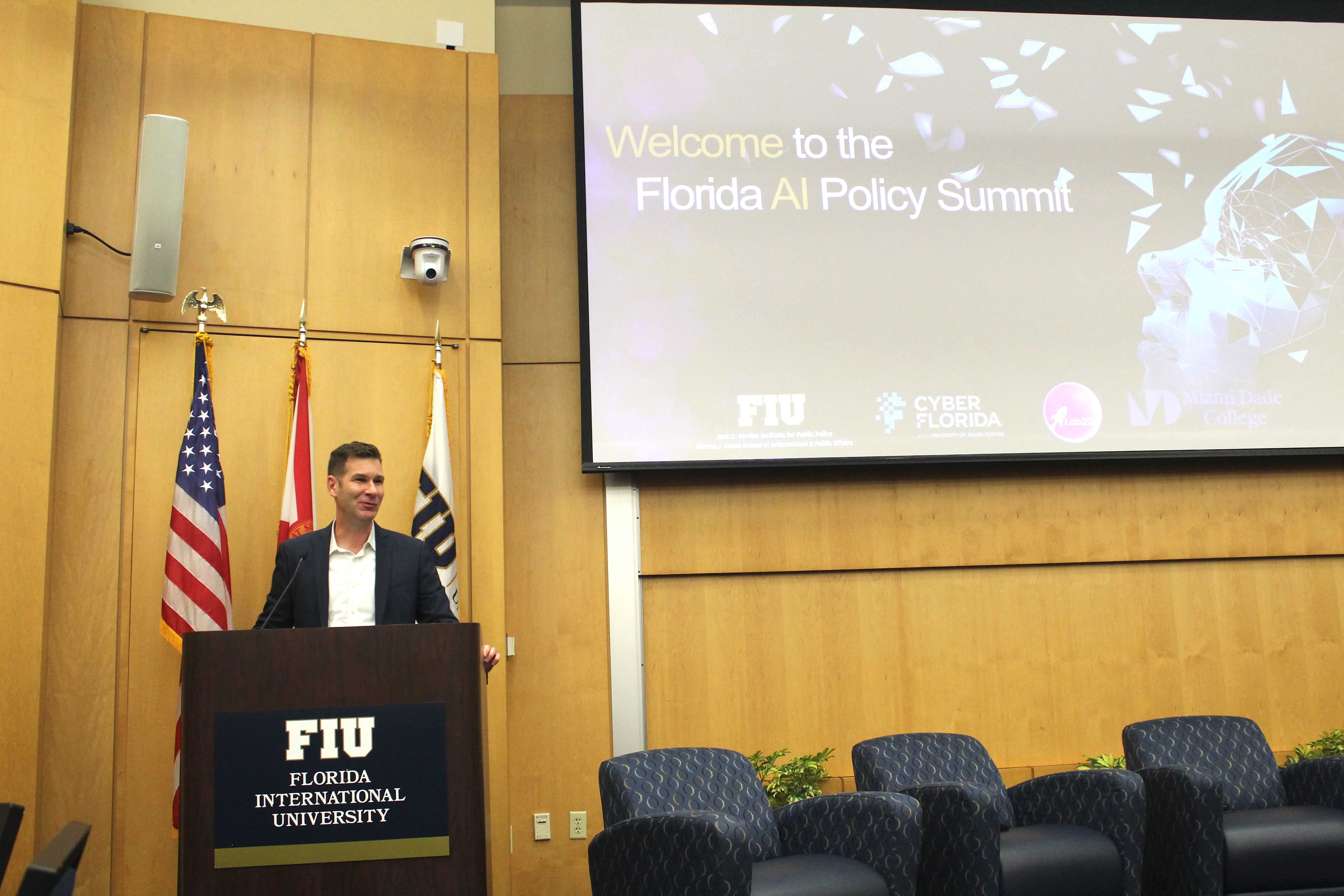With all forecasts pointing to the proliferation of artificial intelligence (AI) in our daily lives, FIU’s Jack D. Gordon Institute for Public Policy (JGI) at the Steven J. Green School of International & Public Affairs convened the first Florida AI Policy Summit in January, which included technology experts and higher education leaders who explored the state’s policies on the issue. It was no coincidence that the Summit began shortly after the opening of the state’s legislative session, which is addressing AI among many issues.
“You name it – AI will have a pivotal and possible tectonic influence on everything we do,” said Brian Fonseca, institute director. “We are aware with regulation in mind, the legislature will put up guardrails to AI. That’s why we invited thought leaders to discuss adoption and adaptation of AI among other subjects. … AI is advancing at an unprecedented pace. Events like the inaugural Florida AI Policy Summit play a pivotal role in uniting thought leaders across sectors to shape policies promoting responsible and ethical AI adoption.”
Peter W. Singer, a senior fellow at New America, a policy think tank, suggested how AI unlocks not only the patterns of machines but also our brains so new approaches to different industries can be fully realized. He views AI as the coming of an industrial revolution.
“All national organizations will have to answer or wrestle with two types of questions: What is possible that wasn’t possible before, what is proper, from an ethical point of view. Or how to teach research. What is probable or possible? And what is our vision of our relationship with that technology,” said Singer.
In addition to four panel discussions with local and state leaders from higher education, elected officials joined other public and private sector experts to discuss topics including AI’s impact on the future workforce as well as other areas. Attendees participated in three breakout sessions to develop policy position papers on critical infrastructures, workforce, and governance, which will be disseminated to state officials starting in April.
Other key, sweeping takeaways from the Summit on the impact of AI included:
- Resistance is futile: Embracing AI is not merely a choice; it's an inevitable journey. The inevitability of AI marks a pivotal moment in the evolution of our professional landscape.
- Multifaceted Role: AI transcends its functional boundaries, evolving into a multifaceted entity – serving as a tech adviser, extension, partner, and representative across higher education, military, business, and public sectors.
- Reshaping Thought Processes: As AI reshapes our collective thought processes in this era, profound questions on ethics, morality, law, and policy will continue to arise.
- Embrace the Journey: Join the transformative journey of AI, where collaboration, responsibility, and innovation converge to shape the future of work and thought.
Building on insights gained from the Summit, JGI will expand its research efforts to explore and respond to emerging AI trends and their impact on various sectors, while also developing new educational resources to equip policymakers, industry professionals, and the public with the knowledge needed to navigate complexities in an AI environment.
JGI also plans to collaborate with other institutions, industry partners, and community organizations, to leverage expertise and resources in advancing AI policy and practice through sustained dialogue and convenings with other thought leaders and stakeholders.
In addition, JGI has launched the Cyber Policy Advisory Board, comprised of influential figures from leading tech companies like David Tepper from Microsoft, Jordana Siegel from AWS, and Pedro Pavon from Meta. This board will provide strategic guidance to promote cybersecurity education, research, and policy development, emphasizing diversity in the cybersecurity workforce.
